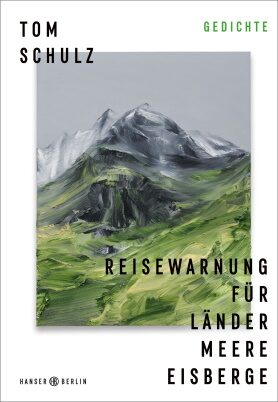Tom Schulz
Reisewarnung für Länder Meere Eisberge
[Travel Warning for Countries Oceans Icebergs]
- Hanser Berlin
- Berlin 2019
- ISBN 978-3-446-26201-0
- 128 Pages
- Publisher’s contact details
Published in Greek with a grant from Litrix.de.
Sample translations
A Disenchanted Paradise
His most recent volume, Travel Warning for Countries Seas Icebergs, leads the reader to several southern European countries, to the Americas, and to other destinations, but the title itself announces that this is not traditional travel poetry, nor is it about recommending poetical experiences. Quite the contrary: the poet questions critically his status as a ‘passenger between paradises,’ directing our attention towards what our constantly accelerating global mobility does to the earth and its once so numerous paradisiacal regions. The moments, in which it’s possible to speak with lyricism of historically significant or exotic places are becoming ever rarer and more precious; more and more political and ecological dynamite pushes itself into our perceptions, demanding an appropriate linguistic response. Tom Schulz reflects on this in a highly conscious way: he doesn’t aim for aesthetic neutrality, but is prepared, instead, to express clear positions, and employ sarcastic exaggerations. The poetical beauty re-emerging from this results from the sensuality of his imagery and his language, which is far-reaching and resourceful, but never impeded by hermetic riddles.
Writing stanzas for both short and long poems using free rhythms, and occasionally employing trenchant prose-poems, Tom Schulz tells stories about flying, about wonderful jellyfish on litter-strewn beaches, about Portuguese ossuaries, and about dogs’ lives in the Moloch of Buenos Aires. He sketches a single day in Syracuse on Sicily, and offers his impressions of a three-month stay in Venice: two dream destinations are demystified, and yet retain their magic. The poet visits plantation workers on the Spanish island of La Palma, but also inspects East German landscapes choked by capitalist progress, and even undertakes an ironical excursion to the Black Forest idyll of Martin Heidegger, the philosopher. As a satirist of Germany and of German life, Schulz is a genuine discovery.
One of the volume’s most impressive chapters takes us to the Greek island of Leros, where Tom Schulz looks for traces of Yannis Ritsos, the poet and resistance fighter: Schulz feels connected to Ritsos not only in literary but also in political terms. Ritsos was interned on Leros in 1968-69; from 1947 until the 1980s, the island was a notorious for being used for ‘reeducation,’ and for banishing mentally ill people to. Today, silence about this past prevails: shoulder-to-shoulder with tourism. Schulz constructs a deeply moving literary memorial to Leros’s archaic landscape and its unresolved history, in the form of twelve poems.
Translated by Henry Holland

By Kristina Maidt-Zinke
Kristina Maidt-Zinke is a book and music critic at the Süddeutsche Zeitung and also writes reviews for Die Zeit.
Publisher's Summary
Alert, present and with a keen poetic style, Tom Schulz’s new poems present him as a committed poet who cannot avert his gaze, or turn away from the world’s fractures and ruptures.
No travel warning could stop him, too great is Tom Schulz’s love of this planet that seems to be moving away from a state of paradise at an ever-faster pace. Wherever he goes in his poetry – whether to Medellín or Venice, the ossuaries of São João or the plantations of Tazacorte – and whether he writes in verse, prose or short form, he constantly tries to break the cycle “of greed and pre-fabricated parts.” In doing so, he uses all the linguistic power at his disposal to create an awareness of the beauty and vulnerability of the world
(Text: Hanser Berlin)
